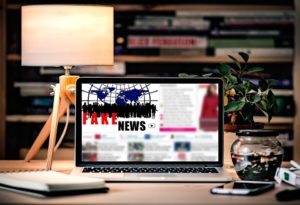Fake News and the Public Relations Industry
Published on February 16, 2016, at 5:30 p.m.
by Tristen Gell.
Public relations professionals and the American public have always had a strained relationship. The public has generally been skeptical of PR professionals. To the public, PR professionals are the people who spin and lie to make something negative sound positive or cover something up. Professionals in the PR industry have always had to defend their career, and now more than ever it is so important that they uphold their responsibility to provide open, honest and ethical information to the public due to the mass circulation of fake news within this past year.
2016 was the year the term “fake news” stepped into the limelight. According to a Gallup poll in September 2016, “Americans’ trust and confidence in the mass media ‘to report the news fully, accurately and fairly’ has dropped to its lowest level in Gallup polling history.”
The American people have generally always been skeptical of the media, but with the mass circulation of fake news in 2016 due to the high use of social media, compounded by the election year, skepticism skyrocketed. Meredith Cummings, president of Alabama Media Professionals and a University of Alabama journalism instructor, believes skepticism is not necessarily a bad thing.
“It is important for the public to be skeptical; I think it’s healthy,” Cummings said. “Skepticism is not cynicism; a healthy sense of being skeptical and learning how to fact-check isn’t the worst thing.”
The public needs to be more diligent in researching the news that is out there. Just like the public, PR professionals need to work harder and research deeper to become more knowledgeable of all the information out there, fake or real.
Dr. Suzanne Horsley, member of the national advanced public affairs team for the American Red Cross and a University of Alabama public relations professor, believes the number one thing PR professionals need to do when seeking information is to be diligent in reading the news.

“We need to become very good consumers of the news,” Horsley said. “You don’t want to be caught off guard by information you haven’t seen yourself. Read all news sources out there; don’t solely rely on the ones you feel comfortable with.”
Consuming information solely from supporters of your organization is not going to prove beneficial. PR professionals should almost be more diligent in keeping up with non-supporters and following what they are saying and what information they are putting out there so that a plan can be put in place to combat the fake news that is published. When handling fake news, PR professionals need to ask questions and educate all publics.
“Ask thoughtful questions and answer them honestly; it starts with that on both sides,” Cummings said. “It’s a difficult fight because so many people don’t have the access to information. I don’t blame people; it’s a fight that all professionals are in now to educate the public.”
Education is more important now than in the past with the increasing circulation of fake news. Not all people have the same access to information, education levels, etc. To educate effectively, PR professionals need to be open with the public and accessible.
“Be an easy source of information,” Horsley said. “Make sure all your information is consistent. It is important to be first, be accurate, be empathetic, be timely and be right. You’ve got to show that you’re human and that you care.”
One new principle that is taking the public relations industry by storm is the recent use of “alternative facts” from people in power. What are alternative facts? Simply put, they are lies. In the PR industry, there should be no such thing as alternative facts. The information professionals put out to the public needs to be fully accurate.
“An alternative fact is just a lie,” Cummings said. “It was an unfortunate phrase for a person in a position of power to use. The fact that people are making fun of it makes me feel better; it makes me feel like Americans are pretty smart.”
Dr. Horsley’s thoughts on alternative facts aligned perfectly with Cummings’.
“I was incredibly disappointed to hear a communications professional try to argue that alternative facts were an excuse for not giving the American people honest information,” Horsley said. “I can only hope that the current administration will begin to surround itself with ethical communicators.”
Rising PR professionals studying the profession will be working in a very different world than ever before. Public relations as a profession is evolving. PR professionals need to be trusted, and they need to be a strong source of accurate information for the public so that we can see a decrease of fake news and an increase in trust in the future.






